I have long been chasing the thrill I first experienced in first grade over the story of Cain and Abel in the Book of Genesis. Cain and Abel were, of course, two sons of Adam and Eve. Cain becomes jealous of Abel (the Lord’s favorite) and then murders him. As punishment he is banished to wander the earth, and Cain begs God to protect him from all the people he’ll encounter in his travels who will kill him. But Adam and Eve and family are the only people on Earth, right? So who are the people who will kill him? Who are those people?? This was creepiness and mystery and awe. These first-grade feelings have to do with an empty earth and a weird one, one in which not everything makes sense to its wanderers.
Other books have come close to provoking this reaction. Often these books are post-apocalyptic; often they feel Biblical. I realized I am fascinated by the way people put societies together—it’s my favorite thing about The Walking Dead, which I see as a series of political experiments. I am fascinated by a world that exists before or outside of civilization; I went through a real intrigued-by-Neanderthals stage because of this. Space movies, too, can inspire it.
Here are five books that have a strange “empty earth” quality and harken back to that young excited awe, the one I got again when I watched Lost, Snowpiercer, I Am Legend, and The Leftovers—a feeling I don’t exactly have a name for, except that it’s both awful and awesome.
Z for Zachariah by Robert C. O’Brien
O’Brien’s book was the first novel I read that conjured this feeling—and also gave me nuclear-related anxiety that is ongoing. I read it in eighth grade as part of a unit that also included The Diary of Anne Frank—a very dark curriculum, in retrospect. Z for Zachariah is written from the perspective of the sixteen-year-old sole survivor of a nuclear attack… and then a stranger shows up.
Buy the Book
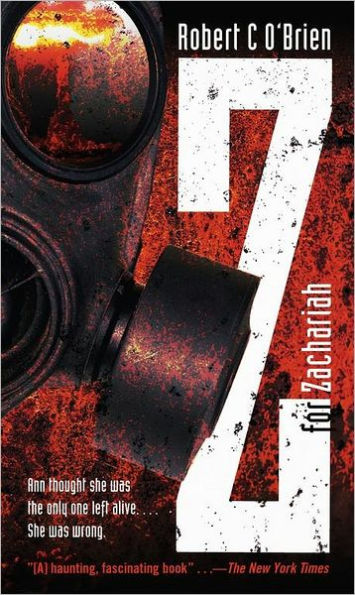

Z for Zachariah
Riddley Walker by Russell Hoban
It wasn’t for many years that this odd feeling would hit me again. Riddley Walker—read in a grad school class—was, for me, a life-changing novel: weird, creepy, dark, difficult, and, in the end, both humorous and (a teeny bit) hopeful. The novel takes place many centuries after a nuclear attack, and its language is as torn apart as its communities are. Dark myths about cannibalism, infanticide, and rape are circulated; there are mutated Punch and Judy shows, and there are inklings of the voice of God. I’m going to cheat and tell you that this novel is the same realm, feelings-wise, as Cormac McCarthy’s The Road: There, also, lie cannibals, and weird scriptural feelings, and horror, and love, and despair.
Buy the Book
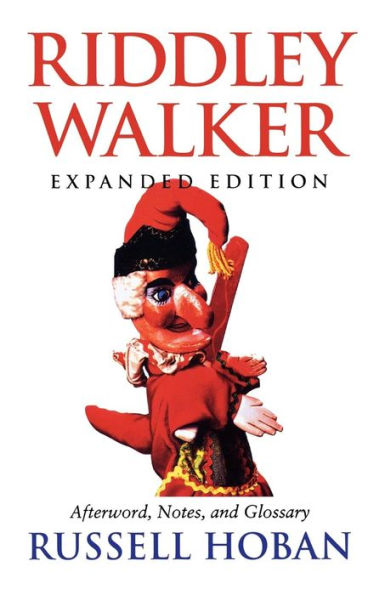

Riddley Walker
“Game” by Donald Barthelme
In some ways “Game” doesn’t fit on this list, but this short story scratches the essential itch for me: It has dark humor, total isolation, terror, and nuclear armament. Two men live underground manning a console, where, if necessary, they must both turn a key to make the “bird fly.” The whole story can be read as Cold War metaphor—game theory applied to nuclear-armed countries—in which each is supposed to shoot the other if the other begins to act strangely. Of course, both are acting strangely. Though it was published in 1965, I first read this story because of a list much like the one I’m making here: one about what to read while waiting for the next season of Lost.
Buy the Book
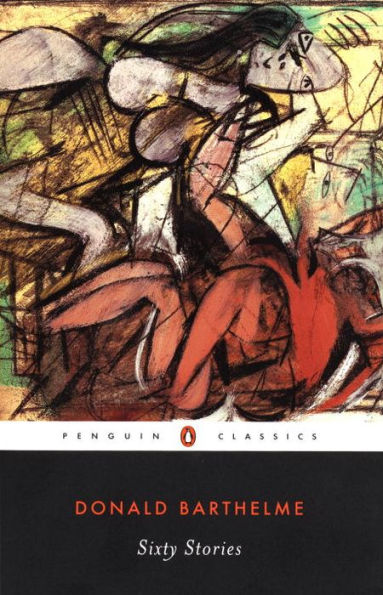

Sixty Stories
The Sundial by Shirley Jackson
The Sundial is one of Jackson’s lesser known works, behind novels like We Have Always Lived in the Castle and The Haunting of Hill House, and, of course, her story “The Lottery.” It is hilarious, absurd, and cruel: a sundial in the middle of a large property reads “WHAT IS THIS WORLD?” Indeed. One horrible rich person starts receiving visions and the other horrible rich people become her believers, even as they snipe at each other. The Sundial offers humor, cultish behavior, and brutal commentary: “Only rabid animals and humans turn on each other,” one character thinks. It delivers the empty earth awe feeling filtered through a particularly WASPy stiff upper lip.
Buy the Book
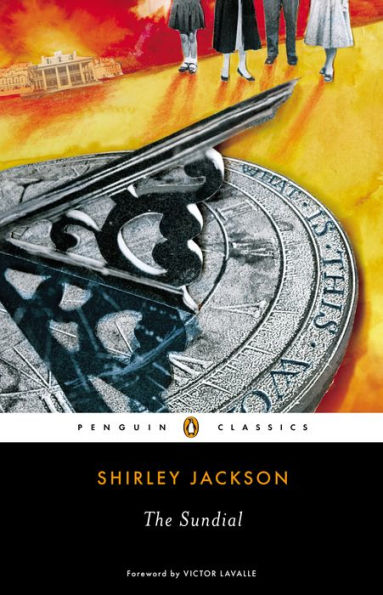

The Sundial
Parable of the Sower by Octavia Butler
Finally, I will leave us with a novel that has it all: marauders, survivors trying to figure out how to procure water and food (acorns are involved), and the hope of space travel. In some ways it is the opposite of The Sundial, in which a group of purely detestable characters try to wait out the end of the world. With its empathic, visionary leader, and its Gospel-derived title, Parable of the Sower adds to this mytho-speculative genre by providing a dose of spiritual hope. People are terrible, but also capable of innovating and adapting, and this capacity to change may lead us both into and out of calamity.
Buy the Book
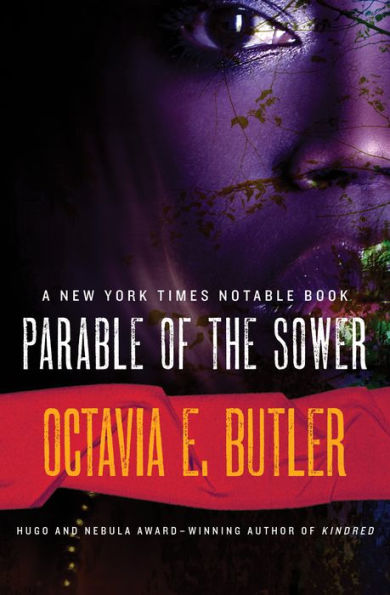

Parable of the Sower
Photo by Hans Birger Nilsen — Barren landscape, CC BY-SA 2.0
 Liz Harmer is a Canadian writer living in California. Her essays, stories, and reviews have been published widely, and her speculative debut novel The Amateurs is recently out with Knopf/Vintage Canada. You can find her on Twitter @lizharmer.
Liz Harmer is a Canadian writer living in California. Her essays, stories, and reviews have been published widely, and her speculative debut novel The Amateurs is recently out with Knopf/Vintage Canada. You can find her on Twitter @lizharmer.










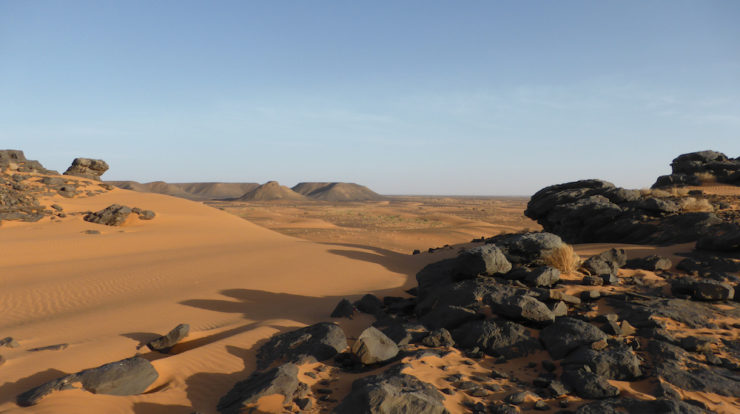
Cain marries into a tribe co-existent with the supposed First Family and has a family of his own. Maybe they were Neanderthals. So we have confirmation of some evolutionary concepts in the Bible?
“Game” was in one of the Merril anthologies, I think the seventh–nope! the eleventh. I read a lot of Barthelme after that one. I read a lot of a lot of writers after encountering them in a Merril anthology. Maybe more than any other anthologist’s work.
@Sunspear no. 1: Wrong genre. Genesis isn’t a book of facts; it’s a book of founding myths retold through a later theological lens. So it’s entirely reasonable for a son of First Man and First Woman to find somebody to marry who’s not in that family. Who were the other people? Not important. Obvs. there was somebody because here we are. But Genesis has to also be about First Man and First Woman because the story of their giving birth to two siblings who become First Murderer and First Victim contains a theological point.
@1, etc. The explanation I’ve heard from fundamentalists Cain’s wife was an unnamed and otherwise unrecorded daughter of Adam and Eve. Only it wasn’t really incest, as the world hadn’t been corrupted to the point where that had become sinful. Or something like that.
Ah, Z for Zachariah. Between that and Briggs’ When the Wind Blows, I was having full-color nuclear nightmares at age 12. I still can’t read or watch anything on that theme, even if promised a hopeful ending.
There’s also Weir’s The Martian, with Watney’s terrible isolation mitigated for the reader by cuts to the situation on Earth.
@4/Skallagrimsen: Well, with no other people in existence, everybody had to marry their siblings. I guess that raises the question when it became sinful, and why.
Rise of Endymion has something similar, with a prisoner in solitary confinement, doomed to be executed by automatic mechanism on a random date.
Related to the Genesis conundrum (which gives some Sunday school teachers headaches when precocious kids figure it out. I’ve yet to hear a good explanation based on text) is the series ender for the rebooted Battlestar Galactica.
The leading characters are from the Adama family. They finally find an Eden-like planet they can colonize as their New Earth. They destroy their vehicles and tech in order to go native. The natives appear to be early hominids.
At one point in the story there was an Admiral Cain. I can easily see the biblical situation arising in this scenario. Science tells that early humans and Neanderthals interbred frequently. One tribe of humans thinks they’re the only creatures on the planet (we can be a narrow and self-centered lot) until they actually run into another.
Early Genesis is deep myth. And is possibly a story derived from a shamanic proto-Jewish culture. Also has something to say to people who study the Kabbalah. It is definitely an answer for why things are the way they are. Was there an Adam and Eve? I say yes, but they may be a composite of everything I’ve suggested and more.
@Sunspear no. 8: I noped out of the Galactica reboot (Torture! Sex!! Sexy torture!!! Idiot balls galore!!!!) before that aired, and I’m glad I did. I grew up reading the pulps. “Adam and Eve…FROM SPAAAACE” has no flesh on its bones anymore.
Getting off Biblical and quasi-Biblical speculation, I have a few suggestions:
The Quiet Earth–the movie, not the book, which is psychological(?) horror devoid of hope. In the movie, a man wakes up in New Zealand on a July morning in 1985 and discovers that everybody else is gone. Not only the humans are gone; the animals are also gone, except for some that were eggs when the [spoiler] happened. For a sizeable chunk of the movie, he believes himself to be the last person on Earth. He isn’t.
Remnant Population by Elizabeth Moon is about an old woman, disrespected and discarded, who decides to stay behind when the extrasolar colony she co-founded is evacuated. Unlike the protagonist in The Quiet Earth, she has a wonderful time, blossoming into her opportunities instead of breaking down psychologically. She also thinks that she’s the only person on the planet; she’s also wrong.
The Day of the Triffids features some excellent writing about the feeling of uneasy isolation both at the beginning, when the protagonist wakes up on the first morning after TEOTWAWKI, and later on when he has decided to go off alone to look for somebody.
Maybe Cain was a hemaphrodite, with both sets of equipment? And gave birth to a brother-and-sister, who had a large family?
With so much inbreeding going on, it’s no wonder humanity ended up behaving so badly.
Thank God for mutations, and genetic diversity.
@Jenny: to be fair, that’s not what BSG was about for most of its run. It was a serious political show and examined questions of identity and being under threat from an Other that humans created. It served as a way to look at the War on Terror.
The stuff I cited was mostly in the finale, which a lot of people hated.
@Sunspear no. 12: It was a bad metaphor for the War on Terror, because one side had actually factually driven the other almost to extinction and was trying to finish the job!
I tuned in hoping for a story about survival with extremely limited resources, continuing culture in the face of destruction, and other things that would actually have a meaning to a population that had been nearly wiped out and driven from their homes. But at the moment when I would have expected a former teacher, accustomed to breaking down knowledge to its component parts and gathering data, to be taking inventory of edible plants in the garden of that one cruise ship, or starting a sign-up program so that the only person who knew how to [skill] on [ship] had a pool of apprentices…she instead busted out with “We need to have more babies.” When she should have been saying, “We need to produce more FOOD.”
I stuck with it, hoping things would improve. My final nope-out was the sexy torture scene. I waited way too long.
Neville Shute’s ‘On The Beach’ has this quality. The loneliness of desolation, and the inevitability of death. Post nuclear war. A bleak but beautiful book.
Also Riddley Walker is probably my favourite novel. If you haven’t read it I urge you to persevere. It might change your life.